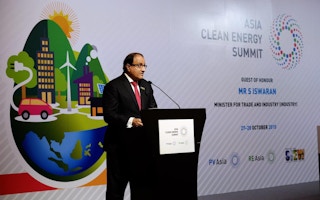International companies plan to spend millions on developing clean energy solutions in Singapore, which is good news for Asia’s low-carbon goals.
Singapore’s trade minister S Iswaran on October 27 announced a slew of multi-million dollar investments which will cement the city-state’s position as a regional leader in sustainable energy.
Addressing an 800-strong audience at the second annual Asia Clean Energy Summit, Iswaran said that five clean technology, or cleantech, companies will spend S$150 million on new projects in the city state over the next five years, creating more than 100 jobs in the process.
The firms are in the solar, fuel cells, smart grids, and certification sectors.
“These investments are a strong vote of confidence in Singapore’s role as an effective cleantech hub, with an emphasis on innovation, project development, and financing activities,” said Iswaran.
Also speaking at the event, held at the Sands Expo and Convention Centre, Carmela Locsin, director general of the Asian Development Bank’s (ADB) sustainable development and climate change department, added that “few countries can match Singapore’s drive in fostering innovation and knowledge exchange in the field of energy”.
German solar firm Gräss Energy will set up its global headquarters in Singapore later this year, while smart grid solutions provider Omnetric, a joint venture by management consultancy Accenture and German energy technology giant Siemens, will establish its Southeast Asian hub in the city-state in early 2016.
“
These investments are a strong vote of confidence in Singapore’s role as an effective cleantech hub, with an emphasis on innovation, project development, and financing activities.
S Iswaran, minister for trade and industry, Singapore
British fuel cells maker Intelligent Energy will open a global supply chain office in the country, while Norwegian energy advisory firm DNV GL will launch a testing centre for communications equipment used in electricity grids, its first such facility outside Europe.
Accenture, in collaboration with the Singapore Economic Development Board (EDB), will also launch a smart grid hub in Singapore to help utilities providers in the region integrate sensors, software, and other technologies into power grids.
Leap-frogging to a clean energy future
ADB’s Locsin noted that sustainable energy solutions are badly needed in Asia Pacific, where energy demand is growing faster than in any other region. The main drivers for rising energy use are rapid economic growth and the need to provide electricity to the 700 million people in the region who still live without it today.
If governments in the region choose to meet this demand with fossil fuels such as coal and oil, the resulting increase in carbon dioxide emissions will undermine efforts to fight climate change.
Instead, Asia can “leapfrog to a future of low carbon development” by adopting technology solutions in the areas of clean and renewable energy, she said.
To achieve this, decision-makers must provide financial and regulatory support help businesses develop new ideas and bring them to market, she added.
One initiative by ADB to equip government officials with the skills to do so is the Sustainable Energy Centre of Excellence (SECOE).
This is an ADB-funded training centre for Asian policymakers on governance and technical issues in clean energy. The centre is headquartered in Singapore and run by the Sustainable Energy Association of Singapore, an industry association.
International Enterprise Singapore, the government agency tasked with fostering overseas trade ties, announced at the summit that it would provide funding to SECOE under its enterprise development grant scheme, known as LEAD III.
Despite such efforts, ‘business as usual’ policies such as fossil fuel subsidies remain entrenched throughout the region and hamper the growth of cleantech markets, said Locsin. Many banks are also unwilling to finance energy efficiency projects due to their long payback period, she added.
To address this, ADB aims to provide member countries with a wide range of financing options and advice on technology solutions for clean energy development.
“Technology is taking on a more central role in our operations, and we are taking steps to encourage the adoption of cleaner and more advanced technologies in our projects,” Locsin said.
Experts at the conference identified energy storage, demand response, and data analytics as some of the most promising developments in the sector.
Energy storage is essential for integrating intermittent power from wind and solar into the grid. Many also consider demand response - a process where electricity consumers are paid to reduce their energy use temporarily in order to provide for a spike in usage elsewhere – as a good way to cater for increased energy use without building new power plants.
David Walker, chief executive of DNV GL Energy, noted that demand response could be a “game changer” for clean energy. This solution relies heavily on smart electricity meters, which analyse usage data in real time and control how devices use power.
Apart from perfecting such technologies, industry players in Asia also need to pay attention to creating the right business models and regulations for the clean energy ecosystem to flourish, panellists said.
For example, Bernard Benz, senior vice president at French utilities firm Engie’s Crigen research and development centre, said that energy costs today are relatively low due to cheap fossil fuels, which discourages investment in clean energy technologies.
To counter these low prices, governments can offer subsidies and other strategies to support the growth of cleantech markets, he added.
Policymakers also need to focus on developing regulatory frameworks to handle the integration of intermittent renewable energy sources into the grid, and pricing it attractively, said panellists.
If governments, businesses, and investors collaborate to resolve the technical and policy barriers to clean energy adoption, they will find that Asia’s “energy challenges are far from insurmountable”, said Locsin.
“We need to work together to set the stage for a more inclusive, resilient, green, and sustainable century,” she added.
This story was originally published on Future Ready Singapore.

















